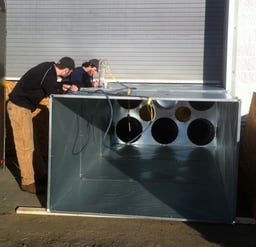
If you were to take a guess right now, how do you think your business would rank for indoor air quality (IAQ)? According to the Organisation for Economic Co-operation and Development (OECD), Americans work an average of 38.6 hours a week. That’s 1,783 hours a year! This means your employees spend roughly a third of the time they are awake breathing the air in your office, facility, or plant.
In a recent Gallup poll measuring workplace satisfaction, employees ranked the physical safety conditions of their workplace as one of the most fulfilled factors. While this is great news for most employers, almost a fourth of respondents felt like there were unsafe elements in the environment where they spend much of their day. Of the many potential workplace hazards, indoor air quality is a critical factor in ensuring a positive, productive team.
Why Is Indoor Air Quality Important?
Indoor air quality measures the air condition inside of and surrounding your building in relation to the well-being and satisfaction of the occupants. Where good IAQ creates a comfortable work environment, bad IAQ can breed a cycle of unhealthy, impaired employees.
 Even short-term exposure to toxins can be dangerous. Many pollutants cause symptoms like those of a cold.
Even short-term exposure to toxins can be dangerous. Many pollutants cause symptoms like those of a cold.
Employees notice irritated eyes and respiratory tracts, headaches, and fatigue. When they leave work, they feel better.
Some pollutants only show effects after the damage has been done. Indoor pollutants can cause heart disease, cancer and other potentially fatal illness.
Health issues aside, poor air quality in your facility can lead to issues with productivity, workplace satisfaction, and attendance. Which, as we know, can directly impact your organization’s operations and ultimately, the bottom line.
While people may react very differently to indoor air pollutants, employers have a duty to provide a safe, non harmful environment for their employees. Understanding and controlling common pollutants indoors can help reduce your risk of indoor health concerns.
What Causes Indoor Air Pollution?
Every business is different, each with a variety of potential indoor air pollution sources. In most cases, air pollution can be traced back to inadequate ventilation, high temperatures and humidity levels, or the release of gases/particles.
Some primary causes of indoor air pollution include:
- Fuel-burning combustion appliances
- Tobacco products
- Building materials from the old (deteriorated, asbestos-ridden insulation) to the new (recently installed carpet or upholstery)
- Odors and chemicals from cleaning products
- Outdoor pollutants such as radon or pesticides
How to Improve Indoor Air Quality
In most cases, the most successful method to eliminate commercial or industrial air pollution is to simply remove or reduce the impact of hazardous sources. For instances where this may not be possible, increasing ventilation will allow you to boost the quantity of fresh air entering your facility and more efficiently release pollutants.
Custom Air Quality Assessments
 When it comes to the health of your business and employees, we always recommend consulting with an expert.
When it comes to the health of your business and employees, we always recommend consulting with an expert.
We are experienced in testing for volatile organic compounds (VOC’s), semi-volatile organic compounds (SVOC’s), nitrogen oxides (NOx), sulfur dioxide (SO2), carbon monoxide (CO), and particulate matter (dust).
Once we have identified your unique IAQ offenders, we will work alongside your business's key stakeholders to develop a corrective action plan.
Each business faces its own hurdles in providing safe, comfortable air for the people who make it run. As Rhode Island's only air quality specialists, we help our clients find cost-effective, data-driven air quality solutions. Don't put your employees at risk for another day, schedule a free consultation with one of our engineers today!







